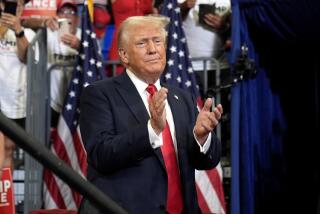Criminal Inquiry of Ukrainian Leader Ordered
- Share via
KIEV, Ukraine — An appellate court judge in Ukraine on Tuesday ordered a criminal investigation of President Leonid D. Kuchma, giving an unexpected boost to an opposition movement that has brought tens of thousands of protesters into the streets in recent weeks seeking Kuchma’s ouster.
Judge Yuri Vasylenko announced at a news conference that he ordered prosecutors to investigate a variety of charges, including allegations that Kuchma, 64, was involved in the disappearance of a Ukrainian journalist and that he sold an advanced radar system to Iraq in violation of United Nations sanctions.
Kuchma’s spokeswoman and a former prosecutor general swiftly criticized the move, but opposition figures, at the same news conference as the judge, called for Kuchma to step down.
“The person who is under investigation should not carry on working. He should step down,” said Petro Symonenko, leader of the Communist Party.
“The fact that a criminal case has been launched shows that we have taken a step toward victory,” he added.
A spokeswoman for Kuchma told reporters that she believed the constitution would not allow such a step. She gave no further details.
Mikhailo O. Potebenko, the country’s former prosecutor general, denounced the inquiry as a “populist” measure that would never stand up in court.
Kuchma pledged to fight the appellate judge’s decision, Interfax news service said. He has denied the charges against him.
The ruling came the day after a team of U.S. and British investigators arrived to investigate the alleged sale of the Kolchuga radar system to Iraq, a charge that has already prompted the U.S. to suspend $54 million in aid to Ukraine.
The radar allegations stem from secret recordings made by Kuchma’s former bodyguard.
Opposition leaders say the veteran leader was also involved in the slaying of reporter Georgi Gongadze, whose headless corpse was found in November 2000.
They also say Kuchma has curbed free speech and normal political activity in the former Soviet state of 49 million people.
Just last week, however, chief prosecutor Svyatoslav Piskun said he had no grounds for pursuing a criminal case against Kuchma; many opposition figures believe that the prosecutor’s office is too closely linked to the president to conduct a fair investigation.
Kuchma, who has weathered months of protests with little difficulty, has vowed to remain in power until 2004, when his second term ends.
More to Read
Sign up for Essential California
The most important California stories and recommendations in your inbox every morning.
You may occasionally receive promotional content from the Los Angeles Times.










